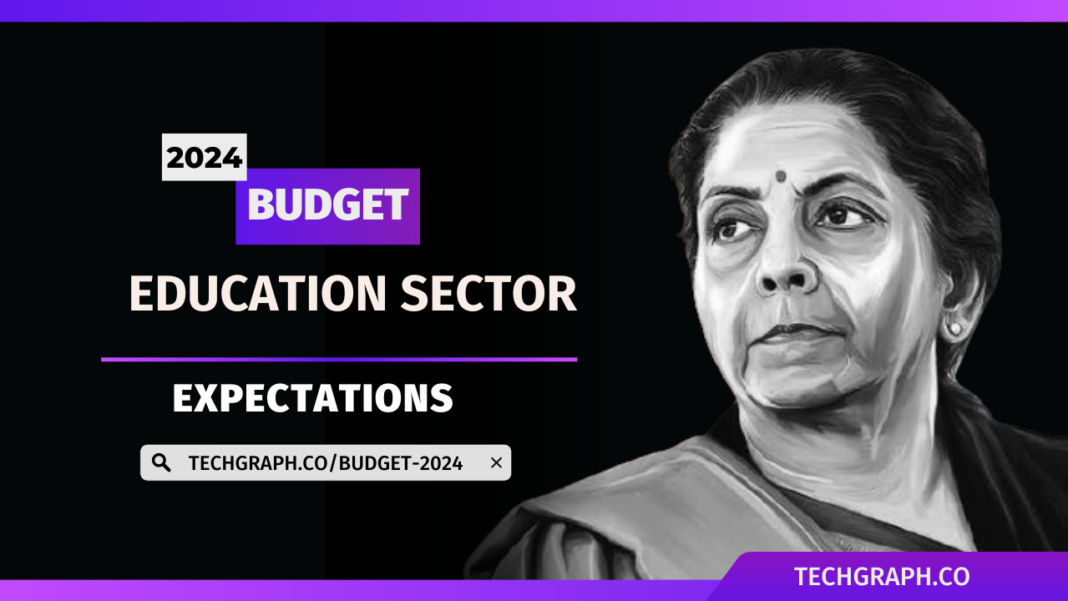As the clock ticks down to Finance Minister Nirmala Sitharaman’s budget presentation on February 1, 2024, the education sector is rife with expectations, eagerly anticipating bold measures that could redefine the landscape of learning in India.
Here’s a breakdown of their perspectives:
Beas Dev Ralhan, CEO, Next Education
In the forthcoming budget, we anticipate a targeted increase in the education budget with a specific focus on EdTech initiatives. This might involve allocating funds for the development of digital infrastructure, content creation, and training programs for educators in technology integration. Additionally, we hope to see tax incentives for EdTech startups, aiming to foster growth and innovation within the sector.
To enhance both quality and accessibility, we look forward to the government establishing a comprehensive framework for evaluating and certifying EdTech content. This could include the implementation of national standards and the creation of accreditation bodies to ensure quality and prevent misinformation. Bridging the digital divide is another crucial aspect, where increased funding for rural broadband connectivity, affordable digital devices, and digital literacy programs will contribute to making online learning accessible to all.
Furthermore, we expect a proactive approach to fostering collaborations. Public-Private Partnerships (PPPs) between EdTech companies and educational institutions should be actively encouraged, leveraging expertise and resources for developing innovative solutions. Additionally, funding for research and development in EdTech, coupled with industry-academia collaboration, can be instrumental in driving innovation and elevating the overall quality of educational offerings.”
Dr Christopher Abraham, CEO & Head, SP Jain School of Global Management
Looking ahead to the 2024 budget, we envision a transformative path for higher education in India. We expect an increase in the maximum loan amount that can be obtained for studying abroad, particularly for programs with steep tuition fees.
To make education loans more accessible for students, we urge the government to explore the possibility of subsidized interest rates. The government’s priorities and the overall budgetary situation will play a crucial role in determining any changes to education loans.
Additionally, strategic investments in skill development, infrastructure, and research will be essential in cultivating a future-ready workforce and promoting innovation. Our strong stance is for prioritizing higher education and acknowledging the continuous requirement for investments in enhancing the gross enrollment ratio. The budget presents a chance to elevate India’s higher education sphere to unprecedented levels, and we eagerly anticipate policies that align with this vision of advancement and distinction.
Sachin Jain, Country Manager & South Asia, ETS India, and South Asia
As we look ahead to the upcoming budget for 2024, ETS urges policymakers to allocate resources that accelerate the global mobility of India’s young talent. This includes the inclusion of language skills and internationally recognized work skill certifications in Indian classrooms.
Skills development enterprises, both public and private, must leverage globally benchmarked and recognized skills framework and certifications as these are valued by employers internationally.” Policymakers should also look at comprehensive merit scholarship programs for deserving Indian students for postgraduate and research studies in foreign universities to drive research and innovation in India post-completion of their studies. We also urge policymakers to advance public-private partnership models that accentuate the “Study In India” initiative, which aims to reinforce India’s position as a Vishwa-Guru to the world.
Manisha Zaveri, Joint Managing Director, Career Mosaic
We are anticipating the upcoming budget’s potential to unlock new opportunities for international student mobility, we are optimistic about the potential of initiatives fostering collaboration between Indian and international universities, creating avenues for cross-cultural learning and research opportunities. A budget that prioritizes global education will not only empower the vibrant minds of young Indians but also solidify India’s standing in STEM fields.
With the Indian study abroad sector poised for a post-pandemic resurgence, the upcoming budget holds immense significance. We expect the government to recognize and harness this potential by implementing measures to make international education more accessible and affordable.
This could involve targeted scholarship schemes for Tier 2 and Tier 3 city students, tax benefits for families supporting overseas education, and streamlined visa processes. A supportive budget addressing these aspects will not only enable students to pursue their international education dreams but also contribute significantly to India’s long-term economic and intellectual growth.
Saurabh Arora, CEO, University Living
In anticipation of the upcoming budget, we at University Living want to draw the government’s attention to essential measures that can profoundly impact Indian students pursuing education abroad. We feel an increase in the fund allocation especially to the higher education sector will be welcomed by the expanding student community in India.
Foremost, we believe lower interest rates on education loans will be a crucial step in alleviating financial burdens for students and their families, enhancing access to education in a destination of one’s choice. Further, there is a critical need for an increase in grants and scholarships for Indian students, providing essential financial support to deserving students. Scholarships play a transformative role, offering support and opportunities for talented students facing financial constraints, to successfully pursue their academic journey.
Additionally, a reduction or waiver in Tax Collected at Source (TCS) while remitting money for overseas education and ancillary activities will be a welcome sign. Lowering or waiving off TCS while remitting funds overseas for education will ease the burden on families and encourage more students to explore educational opportunities at a destination of their choice.
Lastly, exploring student concessions on air travel is imperative to make global education economically viable for a broader demographic of students, fostering cultural exchange and elevating India’s representation on the global academic stage. In summary, we hope these comprehensive budgetary considerations aim to create a more supportive environment for Indian students undertaking international education, fostering academic growth, and contributing to India’s global educational standing.
Anish Srikrishna, CEO, TimesPro
Last year’s Union Budget reflected the government’s commitment to nurturing skilled professionals amidst dynamic changes. To propel our education system to the next level and achieve 100% digital literacy, I propose the implementation of crucial measures.
Firstly, fostering collaboration between the proposed National Digital University and EdTech entities is pivotal. By jointly offering programs, certifications, and employment opportunities, we can efficiently upskill a broader Indian population. The incentivization of such initiatives through tax rebates for EdTech companies will ensure affordability for learners, fostering widespread adoption of technology-led education.
Moreover, increasing public-private partnerships and incentivizing the creation of future-centric courses will empower Indian youth for the job market. The reduction of GST on online learning courses and lowering education loan interest rates will make education more accessible, especially in Tier II & III regions. The digital divide is paramount, hence, there should be an increase in infrastructure allocations to improve rural internet connectivity, and tax relief for students acquiring digital devices will ensure universal access to online education, regardless of geographic constraints.
Lastly, earmarking funds for continuous tech development and establishing a regulatory framework are indispensable for sectoral growth. These initiatives will not only create stability and attract investments but also stimulate innovation, foster entrepreneurship, and ensure the long-term sustainability of our EdTech sector.
Prateek Maheshwari, Co-Chair India Edtech Consortium (IEC), Co-Founder- Physics Wallah (PW)
Given the upcoming interim Union Budget, we would like to appeal to the government to increase the education sector’s budget and reduce the GST slab from 18% to 5% on educational products and services. We aim to establish a strong foundation for the country’s children, particularly those from economically disadvantaged backgrounds.
Additionally, given the evolving world and our shifting approach to education, driving a change to ensure affordable and quality education at scale needs more collaboration between the public and private sectors. For this, reducing the GST on educational services would also remove financial strain on parents, promoting affordability. Apart from this, focusing on collectively enhancing youth skills to increase employability and reduce skilling gaps is imperative for the Indian economy’s growth.
Nitin Godawat, Director CREST Olympiads
PM Modi has envisioned to make India a developed country by 2047. One of the key requirements is to increase focus on education. Since the Government has multiple priorities, it can incentivize startup-ecosystem in the education space to do the following:
- Mental Health Support:
- Research and Development
- Teacher Training
- Tech-enabled Student Learning
- Skill Development and Vocational Training
In the last few years, India has produced several successful startups that have scaled at a global level. Incentives in the form of easier funding, tax rebates, etc. will support startups in the education space to build a future-ready generation
Dr. Madhumita Chatterji, Director, ABBS School of Management
Overall allocation towards education has been around 2.8% to 2.9% of the GDP since 2015. The Indian Department of Higher Education funds central universities, IITs, NITs, IISERs, IIMs, Schools of Planning and Architecture, and others.
The higher education regulators like UGC and AICTE are also funded by the department. Research and innovation in higher education, and scholarships for higher education also come under the purview of the Higher Education Department.
However, in 2022, the Standing Committee on Education, Women, Children, Youth, and Sports observed that student financial aid schemes were not sufficient to cover the cost of higher education. This is because most expenditure from the scholarship is towards course fees. (Report No. 337, Standing Committee on Education, Women, Children, Youth and Sports, on “Demands for Grants 2022-23 of the Department of Higher Education”, Rajya Sabha, March 16, 2022).
The government should earmark specific funds for self-funded autonomous institutions approved by AICTE and offering the PGDM degree as these institutions have to depend totally on student fees.



